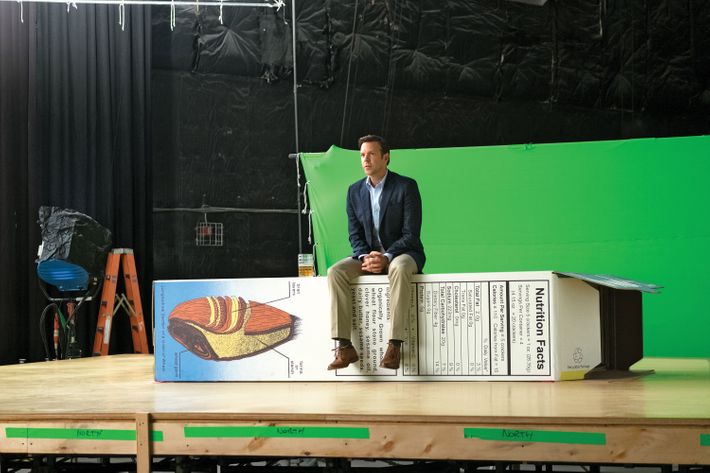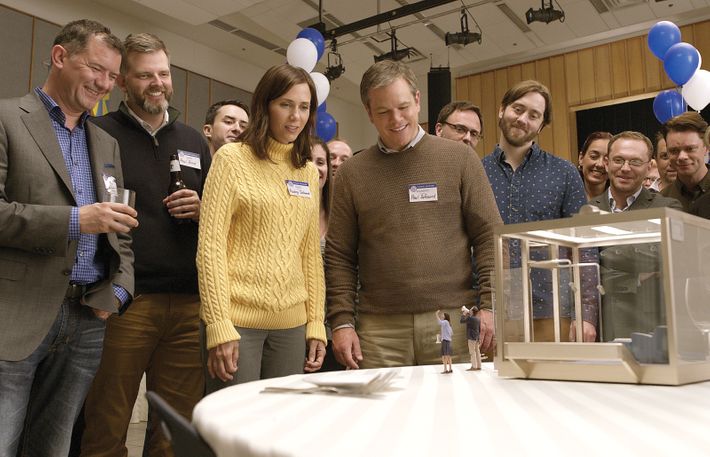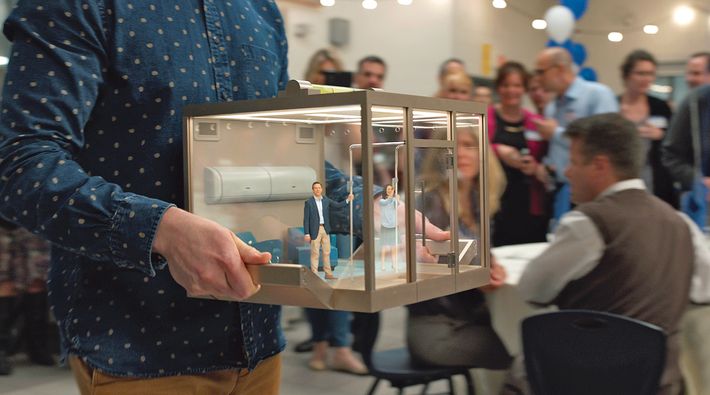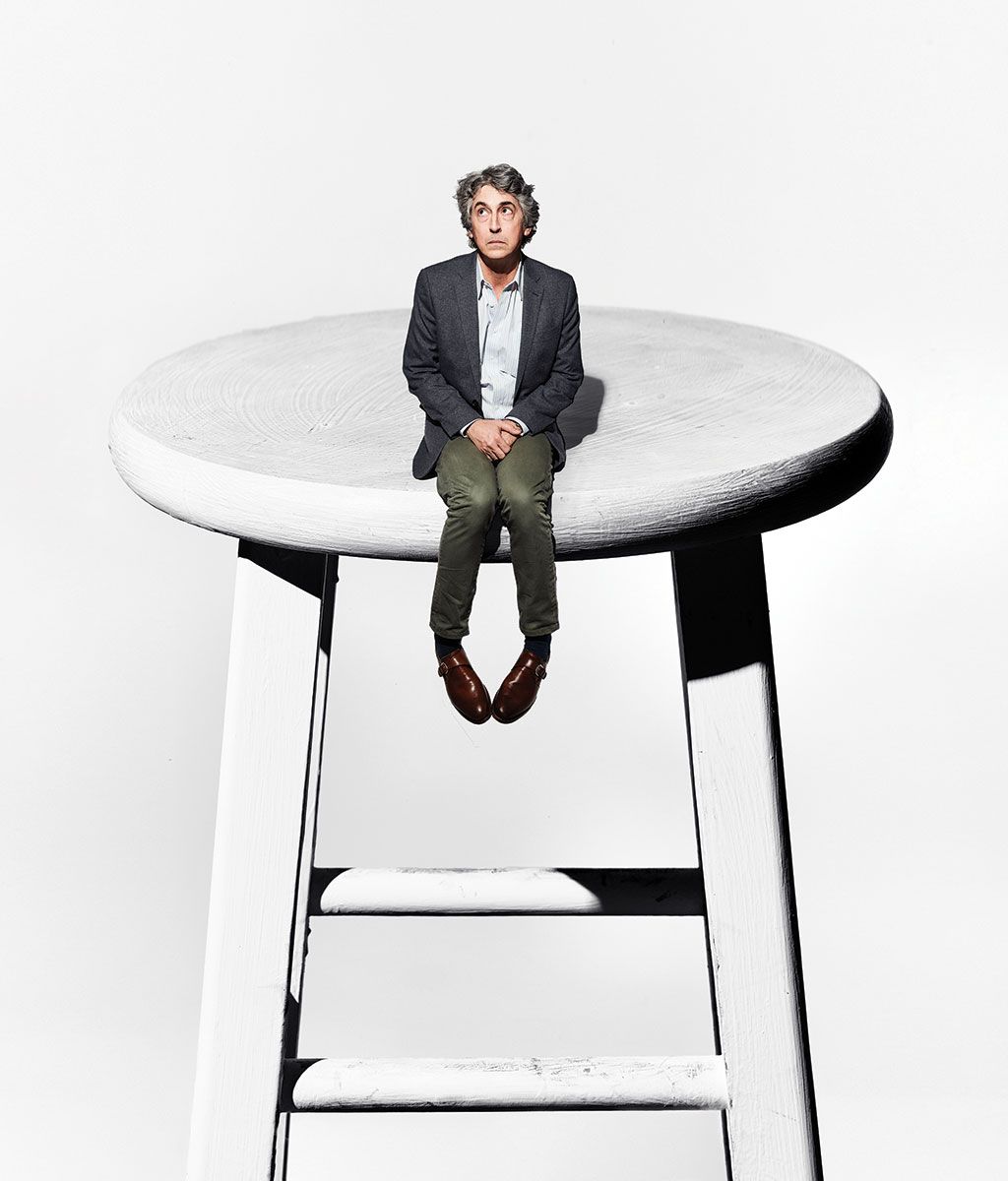Alexander Payne makes movies that are big for their size, somehow both wildly eventful and perfectly pedestrian. You could describe the autumn he’s just had in much the same way. Between the completion and the release of Downsizing, his most ambitious and expensive film to date, the 56-year-old director spent three months in the town of Aigio, population 26,523, living with his young Greek wife and gregarious in-laws and watching the birth of his first child.
A third-generation Greek-American from Omaha, Nebraska (where many of his movies are set), Payne likes to call Aigio the Omaha of Greece. I met him there on October 28, also known as Ohi Day. All of Aigio’s students, dressed in formal blue and white, marched clumsily down Mitropoleos Street as a stern woman shouted into a microphone that on this day in 1940, Greece had said “Ohi!” (“No!”) to an ultimatum from Mussolini. The parade reminded Payne of “a Saturday back in Nebraska when the Huskers are playing, but without Republicans.” Pacing the route in mustard-colored pants and a stripe-sleeved track jacket, the punctilious director couldn’t resist giving a note. “Hey, he’s wearing a clip-on,” Payne shouted, pointing at a preteen boy. “That’s cheating!”
One of Payne’s favorite words is banality, which he considers not an insult but a goal. In six improbably crowd-pleasing dark comedies, including The Descendants and Sideways, he has done the opposite of what Hollywood likes to do, making the exotic and the picturesque look almost plainer than reality. Perhaps for that reason, financing his projects has always been a struggle, even as he’s consistently exceeded box-office expectations. But Downsizing is another story: a movie in which scientists figure out how to shrink people down to five inches tall. Notwithstanding Payne’s directive that “the visual effects be so real as to be banal,” his big concept required a big budget — at least for a movie about climate change, inequality, and the chemistry between a Nebraskan sad sack (Matt Damon’s schlumpy Paul Safranek) and a Vietnamese refugee with a strong accent and a missing leg (Hong Chau as Ngoc Lan Tran). Eleven years in the making, Payne’s movie about little humans is only medium-size by studio standards, but it’s the biggest gamble the filmmaker has ever made.
In 2015, the same year Paramount green-lit what Payne calls “the Vietnam of scripts,” he also married Maria Kontou. “That was all sweet and slightly irritating,” he said, recalling their very Paynean meet-cute on a scenic tour of Aigio. His grandfather (originally Papadopoulos) was born here, and the rest of the family stayed. Two years ago, Payne had planned a short visit to his ancestral town. “My cousin — whose house we just passed — I think he blabbed.” By the time Payne arrived, Aigio’s mayor had arranged a press conference. “They hadn’t had the guts to tell me about it,” he said. “I wouldn’t have come!” Payne felt better when he met a 27-year-old teacher named Maria.
Kontou, who joined us after the parade, has chiseled features and a fierce commitment to local standards of hospitality. “I studied the history of cinema in Crete,” she said, explaining her presence at Payne’s press conference. “And so of course I wanted to go and — ”
“Find a future husband,” Payne said, flashing a smirk. His own features have become a little less chiseled in middle age, a little more like those of his protagonists. Kontou took dozens of iPhone snapshots as we climbed a cobblestoned stairway with postcard views of the Gulf of Corinth. Over the next hour, we ran into her pediatrician, obstetrician, and mother’s best friend, among others. “Everyone knows Alex,” said the obstetrician, Antonios, at which point Payne made campy, Mussolini-style gestures toward the town square. A minute later, Payne spotted another acquaintance. “There’s that asshole,” he muttered, before plastering on a smile. I asked Kontou what she loved most about Payne. “He is so funny, from the moment he wakes up in the morning.” But what is he serious about? Payne cut in: “War, poverty, and injustice.”
He was being self-mocking but not inaccurate. Downsizing is, like most of his work, a funny movie about deep desperation. But it’s unique among his films for being explicitly about something both serious and big: how a global crisis can trigger small acts of kindness and colossal acts of greed. Not long after a Norwegian scientist masters downsizing as a way of reducing consumption, corporations are selling micro-McMansions to middle-class saps like Paul Safranek, while repressive governments are shrinking dissidents like Ngoc Lan Tran. Paul and Ngoc Lan team up on do-gooder missions and then, well … the plot turns are blind and hairpin-sharp, but they arrive at a single dilemma. Payne explained it, as he explains a lot of things, with a film quote: “In The Landlord, Hal Ashby’s first movie, the beginning and ending lines are ‘How do we live?’ How do we live?”

Over lunch in an immaculate taverna owned by Kontou’s oldest friend’s family, Payne thought aloud about why so many Greek immigrants run restaurants, as both his grandfathers did. His father, who also ran a restaurant, wanted Alexander to be a lawyer. (His mother taught college French and Spanish.) Payne thought he might be a foreign correspondent. In high school, he compiled newscasts for Omaha radio, and on his first summer off from Stanford, he covered the 1980 Democratic convention as a stringer. After studying Latin American literature and history as an undergrad, Payne got into the Columbia School of Journalism but wound up pursuing a deeper passion, defying his parents to go to film school at UCLA.
“Dress British, think Yiddish,” said Payne, explaining his polite rebellions. “You play it straight on the outside, but inside, you’ve got other stuff going on.” His M.F.A. thesis film, The Passion of Martin, adapted Argentine novelist Ernesto Sábato’s The Tunnel into a morbidly funny psychosexual thriller narrated by a stalker. It was, he said, “raw in everything positive and negative that that word implies.” Hollywood certainly liked it. A 1990 Los Angeles Times profile compared Payne to a top sports draft pick; an agent called Martin “David Lynch meets Albert Brooks.” Payne signed a deal with Universal and wrote a screenplay that the studio ultimately rejected. But the deal money sustained him for five years, setting a pattern for his studio relationships: hugs and kisses, then shrugs and crickets, and, finally, the breakup. “My whole career is ‘Oh, jeez, we love this last film, mwah, mwah, mwah! It was so new and different; what do you want to do next?’ And you show them a script and they go, ‘Oh, no, this is too new and different.’ ”
Miramax made Payne’s debut, Citizen Ruth, co-written with Jim Taylor, in which a paint-huffing Laura Dern becomes a pawn in the abortion wars. Before Harvey Weinstein became notorious for greater evils, he was infamous for ruthlessly recutting films in accordance with his own version of best marketing practices. “I never particularly wanted to make another movie with him,” said Payne. He refused to tack on a tidier ending, and though some critics found it too downbeat, he thinks the movie was “not ferocious enough.” It grossed far less than its $2.2 million budget. But Payne persisted with Taylor’s help as his newfound writing partner.
Election, featuring Reese Witherspoon’s now-iconic high-school pol Tracy Flick, is “still the movie I get the most compliments on,” said Payne. This month, the classic-anointing Criterion Collection will rerelease it along with a remastered Passion of Martin as an extra. Never mind that Paramount botched Election’s marketing after talking Payne into a lighter ending. “I think the movie was close to getting dumped because it tested so badly,” says Tom Perrotta, who wrote the novel it was based on. Perrotta loved Payne’s new ending, if not necessarily his attitude toward the source material. Perrotta remembers introducing himself to the movie’s star Matthew Broderick on set. “He gave me this weird look and said, ‘There’s a novel?’ ” Payne struck Perrotta as a little superior. “I think Election is a classic satire where the filmmaker is a little bit above his characters. He has gotten softer and sweeter and more emotional over the course of his career.”
Taylor believes the “softening” was just Payne becoming more himself. “He’s a softy but doesn’t want to be seen as a softy,” says Taylor. “He’s kind of an old-world guy, and people can get the wrong impression at first. I was put off by him when I first met him. I thought, Oh, he’s kind of a snob, and he’s not. He can say provocative things, and it takes a while to understand what’s behind all that.”
Payne’s first script, the one rejected by Universal, was smuggled almost wholesale into their third movie, a very loose adaptation of Louis Begley’s novel About Schmidt. That film cost $32 million— almost half of it for Jack Nicholson’s salary — and again it was rejected by the studio that developed it. Amy Pascal, head of Sony at the time, told Payne it was too depressing. “And we said, ‘Yes, but it has Jack Nicholson,’ ” Payne recalled. “And [Amy] said, ‘Oh, you mean an expensive depressing movie.’ ” New Line picked it up, and it grossed over $100 million. Sideways in 2004 followed a similar trajectory. After Payne cast Paul Giamatti and Thomas Haden Church (turning down George Clooney), Universal let the project go. “They said it was only worth $12 million,” said Payne. “I needed $15 million. The movie went on to gross $160 million worldwide. So they lost all that because” — he paused. “Yes, because of shortsightedness.”

Sideways made many best-of-the-year lists and earned Payne a Best Screenplay Oscar. The effusive acclaim spooked him. “I never thought it was a serious movie,” he said. Overwhelmed by requests, he took a breather. He and Taylor doctored a few lucrative scripts — Jurassic Park III, Baby Mama, I Now Pronounce You Chuck and Larry — the last two of which Payne never saw. He directed the pilot for HBO’s Hung. He divorced his wife of three years, Sideways actress Sandra Oh. He spent seven years navigating the torments and temptations of Hollywood, lost at sea for almost as long as his mythic countryman Odysseus. In Payne’s case, home was not a place but a movie: Downsizing.
The germ of the idea came from Taylor and his brother, who had made a parlor game of calculating how far your money could go if you shrank. Payne and Taylor showed an early script of Downsizing to Fox — whose Searchlight division had made Sideways — with a proposed budget of over $100 million. When Fox passed in 2009, Payne moved on — temporarily. “I never lost faith. I’m not saying the movie’s great, but I knew the idea was great.” He made The Descendants and Nebraska, which allowed him to stretch in other ways (mastering the subtleties of Hawaiian culture; making a film in black and white). He also evolved on a deeper level. In those films as well as Downsizing, “I found myself more interested in stories where the climax was not a climax of violence but a climax of kindness.”
One of Fox’s issues was Payne’s initial cast. His idea for our Everyman Virgil in this brave little new world was Paul Giamatti. “We had a fantastic time with him on Sideways,” said Payne, who dreams of having someone like Giamatti as his movie alter ego. “Kurosawa had Mifune, and Fellini had Mastroianni, Antonioni had Monica Vitti, Ford had John Wayne.” Payne’s “midwestern, nice-guy, middle-class schnooks” deserve their own avatar. “If you took all 6 billion faces on earth and put them all together,” said Payne, “you’d come up with Paul Giamatti.”
But when you’re shrinking people, verisimilitude costs money. Whatever else he did, Payne needed a smaller budget and a bigger star. For the lead part, he said, “financiers made it clear to us that we needed someone from this very short list of movie stars with huge-budget credits to their name. Among those, the only one who I believe can pass as an Everyman today is Matt Damon. You could have seen Jack Lemmon or Dustin Hoffman or James Stewart in the old days, but nowadays all you have is these muscle-bound goyim named Chris.” Even Damon had to wear a prosthetic belly, having just hulked out for Jason Bourne — though he shed it later in filming as he let himself go.
With some finagling, the budget went down by a quarter, to $75 million. (Ultimately, it cost a little less.) Even then, it was two more years of limbo. Megan Ellison’s Annapurna Pictures funded casting and scouting but ultimately backed out. Once more, Payne took his start-up money and went shopping. “And that,” said Payne, “is when [then–Paramount CEO] Brad Grey said, ‘I know it doesn’t make sense on paper, but we’ll do it anyway.’ ”

Payne never worried that a movie about climate change would grow stale — it’s only gotten warmer, after all — but he couldn’t have foreseen how well Downsizing would fit the mood of a country and a world in political crisis. “It’s an ugly time,” he said. “But all politics is local,” and Paul Safranek’s personal mandate is ours: “To realize, as we all should, that it all can end and we must accept that, just as we must accept that we will die. Only when we accept those things are we empowered to combat them, if not defeat them.”
He finished these thoughts in the aftermath of our meat-and-wine-heavy lunch in Aigio, winding down toward an afternoon nap. His wife brought over their 5-week-old daughter, Despina — tiny, soft, and silent. I told Payne it must have felt odd to confront our collective demise while deciding to have a child. “Well, it’s just one,” he said. “And maybe she’ll be our salvation. She’s so peaceful I think she’ll be the new Dalai Lama.”
Despina was a leap of faith into the unknown, and so was Downsizing.
“It was this whole different way of doing a movie,” says Taylor. Payne had to learn quickly how to say, as one of his producers, Mark Johnson, puts it, “ ‘I don’t know what I’m doing here, but this is what I want.’ ” The relative Luddite became the taskmaster of the special-effects wizards at Industrial Light & Magic. “I’ve learned that doing a visual-effects film is a lot like having contractors in your house,” said Payne. “It’s all hugs and kisses for quite a while, and then you get down to the deadline and they have other jobs that they’re moving on to and you have to say, ‘Wait, no, get back here, it’s not good enough! And no, you’re not charging us any more.’ ”
The result is a sui generis alloy of computer effects and lo-fi sight gags. The downsizing machine looks and sounds like a microwave, emitting a final “Ding!” The most striking Big Reveals are of an oversize Norwegian sunset and a downsized shantytown built into a construction trailer. That’s not to suggest that Payne skimped on the requisite world-building of science fiction. But the exuberance was in the ideas rather than the effects. “It’s a bit of a kitchen-sink movie,” said Payne. “We were greedy.” In script revisions, Taylor felt himself pushing back against Payne’s desire, after so many intimate movies, to go wide. “There has to be some sense of ambition, of trying for something bigger,” says Taylor. “So I wouldn’t fault him on that. I just felt like I wasn’t sure this needed to be so … It’s funny, because it’s a question of scale.”
Downsizing feels both big and small — sweeping in its scope and its beautiful landscapes even as it traffics in miniatures, posing weighty questions even as it lands on one midwestern schnook’s little problems. “There’s really no studio film like this,” says Payne’s cinematographer, Phedon Papamichael. “Somebody did a big visual-effects film that cost a lot of money and is not following a Hollywood formula. And that’s why I hope it does well, because it will help all of the studios make different choices.”
That’s a lot of responsibility to put on a movie. Payne claims to be philosophical about it. He quotes from Caesar crossing the Rubicon: “Alea jacta est. The die is cast. My fortune has been foretold.” As for what’s next, Payne would like to make a movie in Greece (in Greek), and also a period Western, and maybe a documentary, where there’s “no hair, no makeup, everyone knows his or her dialogue.”
“Some questioners have said, ‘Wow, what a departure Downsizing is,’ and I say it’s actually disappointingly similar,” he said. “These first seven movies I’ve made are just child’s play. I’m just practicing études. I’m often haunted by something I read by Pedro Almodóvar years ago: ‘I’ve made so many feature films, received awards, but somehow I feel I haven’t yet made the film I wanted to.’ You can feel like there’s some depth you want to hit and express well and leave the world knowing, Well, at least I did that. And that’s unconnected to public acclaim. It’s something you know within yourself: In this one, I really touched the farthest wall.”


